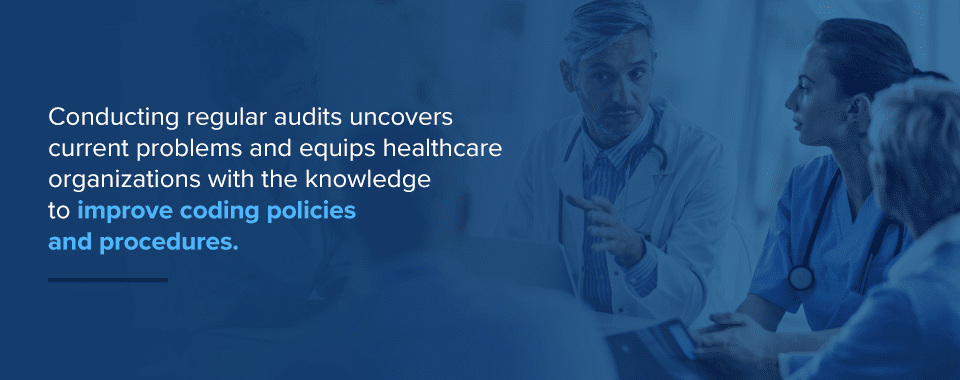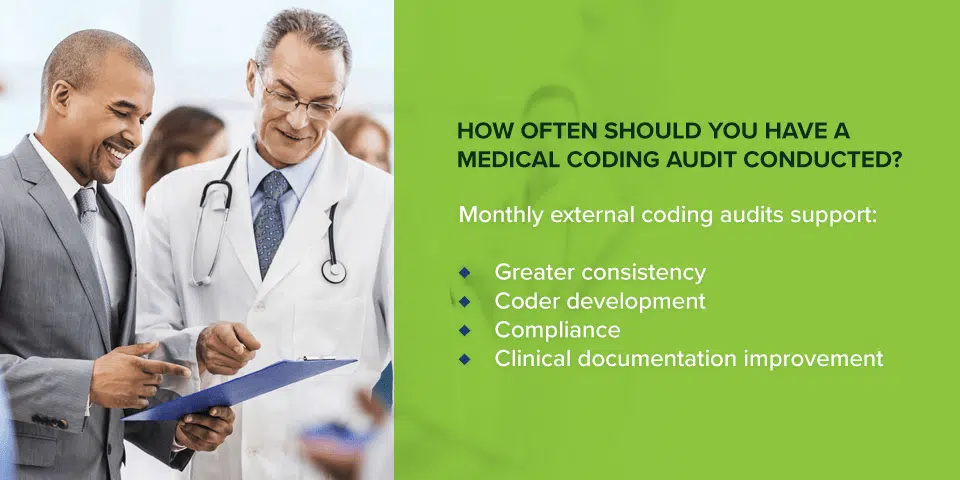Celebrating 20 Years in Business

Accurate medical coding plays an essential role in healthcare information management and overall quality of care. Medical coding audits, both internal and external, ensure that healthcare organizations have the proper policies and procedures in place to achieve quality medical coding.
Regular audits can reveal inaccuracy issues, such as outdated codes or even fraudulent billing. These audits provide a quality assurance process that helps organizations obtain proper reimbursement and maintain regulatory compliance. We compiled this guide to the importance of medical coding audits, showing how they can improve medical coding accuracy, to aid organizations seeking greater accuracy and accountability.
With the majority of healthcare organizations formalizing compliance programs, the need for medical coding audits is clear. The consequences of not auditing medical code include exposure to compliance risk and lost revenue. Conducting regular audits uncovers current problems and equips healthcare organizations with the knowledge to improve coding policies and procedures.

A few of the common issues medical coding audit services can uncover include:
Compliance is one of the most important reasons to audit medical coding. Medical coding and billing are subject to compliance with the payer’s policy, including Medicare, Medicaid and private payers, and with regulations from the Office of the Inspector General (OIG). Systematic failure to comply with these regulations can trigger compliance audits. The discovery of billing fraud will result in hefty fines and damage to the organization’s reputation.
Medical coding audits not only uncover problems and opportunities to improve, but they also highlight what coding processes are being done right. There are multiple reasons to audit medical coding, but it ultimately boils down to protecting your organization.
So, you understand what is at stake, including compliance risk and lost money, when healthcare organizations do not commit to regular audits of medical coding. It is also important to understand how exactly accurate medical coding and audits benefit healthcare organizations.
Compliance and billing fraud is a major issue in the healthcare industry. According to Medical Economics, in 2016, Medicare’s fee-for-service improper payment rate, which measures payments that did not adhere to Medicare coding and billing regulations, was 11 percent, equivalent to $40.4 billion. These improper payments are either the result of billing errors or fraud. In 2016, the Medicare Fraud Strike Force charged 301 healthcare professionals with $900 million in Medicare billing fraud.
The most common causes of improper billing, says Medical Economics, include:
When it comes to fraud, up-coding and billing for unnecessary services, services not provided or appointments patients did not keep are the most common acts.
Medical coding audits can uncover improper billing practices, whether caused by error or fraud. Healthcare organizations can make the proper updates to billing protocol and staff training to ensure further billing mistakes and intentional fraud are not committed, ultimately reducing risk and potentially saving organizations from being slapped with hefty fines.
The Central Learning 2nd National ICD-10 Coding Contest found that medical coding accuracy largely falls beneath the standard of 95 percent accuracy. For example, the average coding accuracy for overall inpatient cases was 55 percent in 2016. That number increased to 61 percent accuracy in 2017. Coding accuracy was even lower for ambulatory surgery and the emergency department.
Accuracy in medical coding is essential to avoid compliance consequences and for your patient records and overall quality of care. For example, the accuracy of medical coding affects healthcare organizations’ quality reporting and risk adjustment.
Medical coding audits can identify issues, such as poor documentation, that affect coding quality. Poor documentation affects patient records and makes it difficult for medical coders to do their jobs. In addition, accurate coding for quality reporting is becoming increasingly important as the requirements for value-based reimbursement evolve.
Inaccurate coding leads to healthcare organizations losing money. Inaccurate coding can result in denied and rejected claims. When a payer reviews and processes a claim only to deem it unpayable, the claim is considered denied. This can occur due to coding errors caught after processing or because the claim goes against the provider-payer contract. Rejected claims do not even make it through the payer review process due to multiple errors. Whether a claim is rejected or denied, it will take time to correct the errors and resubmit the claim in order to receive reimbursement.
In other cases, claims with inaccurate coding will make it through the payer process. Under-coded claims leave money on the table, while up-coding leaves healthcare organizations vulnerable to regulatory fines.
Medical coding audits will find areas in the coding process that lead to lost revenue. Afterward, healthcare organizations can adjust their coding processes to avoid future damage to the bottom line.
Coder education is one of the most valuable benefits of medical coding audits. Investing in coder education helps healthcare organizations prevent future errors that lead to compliance while decreasing fraud risk and lost revenue. Here are some tips for using audit results to educate medical coders:
Coding audits in healthcare can be conducted internally and externally. Here is the difference between the two options.
An internal coding audit is conducted by staff members employed by the healthcare organization. In larger healthcare organizations, this can mean members from the audit department conduct the review of coding procedures and processes. In smaller organizations, a medical coder trained to conduct audits may be in charge of this task.
When conducting an internal coding audit, healthcare organizations have a number of steps to consider. You need to understand what the audit will cover:
Next, internal auditors can take regulatory compliance into consideration by checking the areas subject to high compliance risk. Finally, it can be helpful to audit areas that had inaccuracies uncovered by previous audits. Selecting random areas to audit can also help uncover unexpected inaccuracies. After obtaining the results, the healthcare organization needs a plan of action to understand the results and apply them to make changes in the coding process.

Third-party medical coding audits are performed by professional medical coding audit companies. Internal coding audits certainly have value, but external audits have the benefit of being objective. Additionally, companies that specialize in this process can often offer advanced medical coding and auditing services beyond what a healthcare organization can accomplish internally.
When undergoing an external coding audit, healthcare organizations do not need to perform the auditing process, but they can prepare for the process and its results. Before the audit, organizations can set expectations and goals. External auditors can then tailor their work to the organization.
Healthcare organizations also need to prepare their medical coders. An external audit can be a stressful event. Coders need to understand the audit is not designed to tear down their work, rather it is a way to help the team develop and improve. The coding team will also need to prepare to give external auditors access to all of the records they need and be ready to communicate with them. When it is time to audit medical coding, healthcare organizations should view external auditors as an important resource.
Once external auditors complete their review, they will present their findings and offer recommendations for improvement. Getting the most ROI out of an external audit means taking those recommendations seriously and effectively implementing change.
How often to audit medical coding can depend on any number of factors, including the size of the organization, the rate of staff turnover and regulatory updates. The experts recommend an external coding audit at least once a year, but many healthcare facilities commit to monthly external coding audits to reap as much benefit as possible. Monthly external coding audits support:
Monthly coding audits help healthcare organizations catch errors more frequently, which means they can recapture more revenue and rectify the errors resulting in lost revenue. The insights gained from monthly audits can be used to keep medical coders up to date on the latest regulatory requirements and help them avoid common errors. The results of monthly audits can also be used as an important tool in onboarding new coders.
Annual reviews offer a retrospective for 12 months, but organizations may need to make updates to their processes more often than that. For example, the American Hospital Association Central Office releases coding updates on a quarterly basis. Coding audits conducted on a monthly basis can determine if those updates have been properly applied, and organizations can make necessary adjustments sooner rather than later.
Armed with monthly audit insight, healthcare organizations can more rapidly identify areas for clinical documentation improvement, which enhances the overall coding process. Committing to audits more than once a year, whether monthly or on a quarterly basis, is an investment, but the sooner inaccuracies and lost revenue are discovered, the greater the return on investment.
An external coding audit gives healthcare organizations an objective, third-party assessment of their medical coding procedures and policies. If your organization is looking to improve compliance and prevent lost reimbursement, independent medical coding audits are a great place to start. HealthCare Resolution Services has fully qualified coding compliance auditors who can look into your organization’s entire medical coding process to reveal inefficiencies and compliance risk.
HCRS has the experience your organization needs to improve medical coding accuracy. We work across military, government and civilian organizations. Over our two decades of performing healthcare medical coding audits, we have helped the Medical Integrity Program (MIP) recover approximately $40 million in improper payments, and we have maintained 95 percent or greater accuracy in our work. For every $1 spent on our expert services, we have found $8 in incorrect payments for our customers.
Whatever kind of healthcare facility you run and no matter what kind of services you provide, we are equipped with the expertise to audit your medical coding processes and set you on the path to capturing more revenue and protecting your organization from fraud and compliance risk. Contact us to learn more about our services and how we can help your organization.